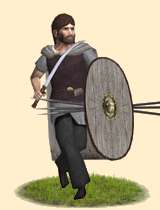Komatai (Dacian Skirmishers)
 |
Weapons | Defence | Mental | ||||||
|---|---|---|---|---|---|---|---|---|---|
| Primary | Secondary | Armour: | 3 | Morale: | 11 | ||||
| Type: | spear | sword | Shield: | 3 | Discipline: | normal | |||
| Attack: | 4 | 9 | Skill: | 9 | Training: | untrained | |||
| Charge: | 4 | 4 | Recruitment | Other | |||||
| Lethality: | 1 | 0.13 | Soldiers: | 50 | Hit Points: | 1 | |||
| Range: | 55 | 0 | Cost: | 868 | Mass: | 0.95 | |||
| Ammo: | 6 | 0 | Upkeep: | 217 | |||||
| Turns: | 1 | ||||||||

Untamed warriors capable of versatile maneuvers on the battlefield, these men fight bare-headed to assure the gods of their fervor and willingness to arrive at their side.
The Komatai, also called ‘Daoi’ or ’Wolves,’ make up the bulk of the tribal forces of the Getai. Untamed warriors, they are still capable of versatile manoeuvres on the battlefield. They fight bare-headed to assure the gods of their fervor and willingness to arrive at their side. The Komatai go to battle wearing studded leather armor, baggy trousers and a large oval shield. They also carry with them javelins and a sica. They are best used as skirmishers for hit-and-run tactics and can be deadly in forests. If forced into melee they can hold their own against other light and even some medium infantry.
Historically, the Komatai were the perfect example of the transitional process of the tribal communities to a stately structure. They were free men, still gathering at the tribe’s calling, but the tribe’s calling was increasingly a response to a call from a tribal union or from the Basileus himself. By the middle of the third century BC large unions of tribes had begun to fight for the hegemony in the area from the Karpathes to the Istros. The Komatai made up the vast majority of warriors, while the disparities between the Komatai and the noble Tarabostes grew to an even greater extent. The Getic warriors were renowned for their zeal in battle—it was rumored that they did not fear death because of their belief in the immortality of their souls.